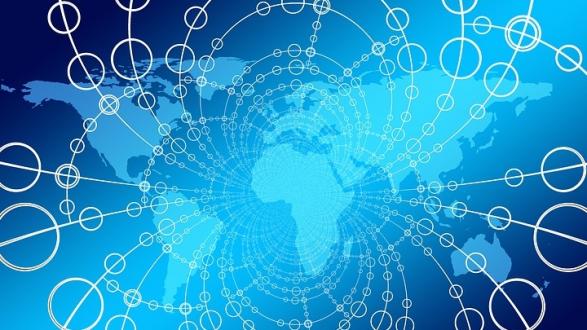In:
Most may not know it, but 2017 has been a major year for blockchain technology. Many individuals are familiar with Bitcoin, an early use case of a blockchain and a digital currency with libertarian roots that emerged in response to the 2008 financial crisis. However, blockchain technology offers much more than a single digital currency.
At its core, a blockchain is a decentralized ledger system for recording and verifying digital transactions. As a result, individuals can securely execute transactions without oversight and fees from traditional intermediaries such as banks and governments. As a consequence, systems like taxation, censorship of information, and governance itself have the potential to be disrupted, with potentially significant implications for international politics. It is critical to understand what this might look like.
One feature of blockchain technology is the ability of organizations to mint their own digital currencies, termed "cryptocurrencies," and to move these currencies between accounts throughout the world in minutes. These currencies hold real value and can be bought and sold 24/7 on stock market-like exchanges, including with fiat currencies like the U.S. dollar. This capability makes it potentially easy for individuals to exchange money without the government having the ability to track or tax these transactions.
Countries that tightly restrict access to internet news and data, like China and North Korea, will have an increasingly limited ability to prevent the free movement of information.
Especially in countries with hyperinflation like Zimbabwe and Venezuela, Bitcoin has started to become an alternative currency. This has the potential to cut the tax revenues that fund many government functions, with less developed nations and their low-value currencies likely to see the brunt of this phenomenon first.
Blockchain technology can also be used to move digital information other than currencies. Communications and Digital IP can be sent and paid for without traditional identity markers attached to transacting accounts. As a result, censorship practices of more restrictive governments become compromised. Countries that tightly restrict access to internet news and data, like China and North Korea, will have an increasingly limited ability to prevent the free movement of information. And, as nearly every information enabling technology, from the printing press to the internet has shown, this can lead to the destabilization of oppressive regimes.
Additionally, governments’ extensive monitoring and "wiretapping," famously exposed by Edward Snowden, becomes more difficult through blockchain-based communications. A diminished ability to monitor international friends and foes will surely reshape how countries interact and communicate.
The concept of smart contracts, agreements written in code and executed automatically upon the satisfaction of preset conditions, makes enforcing agreements and even distributed voting rights possible without a traditional government to intercede.
The ability to also track and follow the movement of digital currency, paradoxically, makes it possible for greater transparency to emerge as well. Organizations like Disberse have already started to change how international aid funding can be traced to ensure it reaches the intended organizations and individuals.
Potentially any system with complex flows of information, like supply chain, can be restructured such that the movement of goods and funds can be traced clearly, end-to-end. It is easy to see how nations and powerful institutions within them could be effected by this newfound oversight and accountability.
Entire new systems of governance have even started to emerge. The concept of smart contracts, agreements written in code and executed automatically upon the satisfaction of preset conditions, makes enforcing agreements and even distributed voting rights possible without a traditional government to intercede. For example, Aragon, allows for decentralized organizations to operate independent of national identity. It is unclear who would sanction or regulate these organizations other than the established governance rules of Aragon itself. The ability for subversion and asymmetrical applications of a rule, or law, changes dramatically if written in computer code.
These potential disruptions have led to variable responses from countries throughout the world, with everything from China’s bans of the Initial Coin Offering funding mechanism being used by many new blockchain start-ups to widely permissive regulations in countries like the Philippines and Switzerland.
Blockchain technology will require governments to form policies around how to approach organizations engaged in the nascent sector and how to use the technology themselves.
Both as an economic engine and an innovative technology, blockchain technology will require governments to form policies around how to approach organizations engaged in the nascent sector and how to use the technology themselves. Additionally, countries that can lead international efforts to standardize protocols and policy around the globe in order to shape it in their favor will benefit from this technology.
Governments should be asking themselves several questions about blockchain technology on the international stage: How can the technology be regulated to both protect citizens and provide competitive advantages? How can the efficiencies inherent to it be used to improve government functions? How can it be integrated into existing economic, political, and social institutions to allow for both progress and stability?
Though the industry as a whole is still in its infancy, many people have likened the current milieu to the early days of the internet. Those interested in the sector would be wise to look back on how the internet developed and learn from both the mistakes and opportunities that period offered.
____________________
Alexander Blum is a Pacific Council member and a managing partner at New Bloom, a management consulting firm.
The views and opinions expressed here are those of the author and do not necessarily reflect the official policy or position of the Pacific Council.




